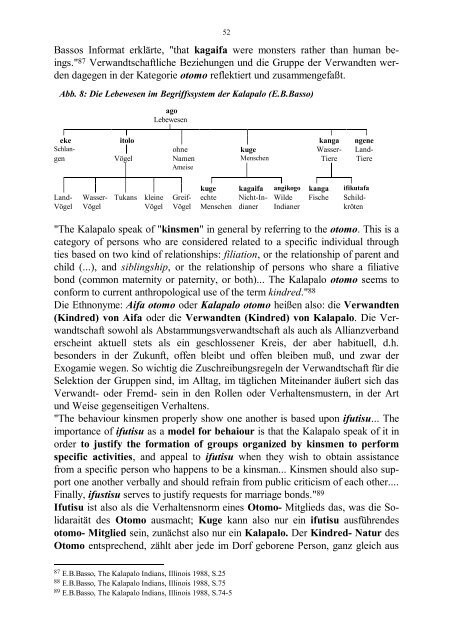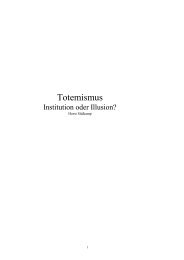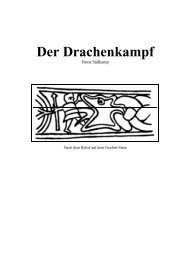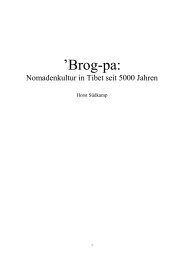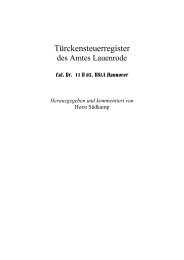Das Ethnonym - Horst Südkamp - Kulturhistorische Studien
Das Ethnonym - Horst Südkamp - Kulturhistorische Studien
Das Ethnonym - Horst Südkamp - Kulturhistorische Studien
Sie wollen auch ein ePaper? Erhöhen Sie die Reichweite Ihrer Titel.
YUMPU macht aus Druck-PDFs automatisch weboptimierte ePaper, die Google liebt.
52<br />
Bassos Informat erklärte, "that kagaifa were monsters rather than human beings."<br />
87 Verwandtschaftliche Beziehungen und die Gruppe der Verwandten werden<br />
dagegen in der Kategorie otomo reflektiert und zusammengefaßt.<br />
Abb. 8: Die Lebewesen im Begriffssystem der Kalapalo (E.B.Basso)<br />
ago<br />
Lebewesen<br />
eke itolo kanga ngene<br />
Schlan- ohne kuge Wasser- Land-<br />
gen Vögel Namen Menschen Tiere Tiere<br />
Ameise<br />
kuge kagaifa angikogo kanga ifikutafa<br />
Land- Wasser- Tukans kleine Greif- echte Nicht-In- Wilde Fische Schild-<br />
Vögel Vögel Vögel Vögel Menschen dianer Indianer kröten<br />
"The Kalapalo speak of "kinsmen" in general by referring to the otomo. This is a<br />
category of persons who are considered related to a specific individual through<br />
ties based on two kind of relationships: filiation, or the relationship of parent and<br />
child (...), and siblingship, or the relationship of persons who share a filiative<br />
bond (common maternity or paternity, or both)... The Kalapalo otomo seems to<br />
conform to current anthropological use of the term kindred." 88<br />
Die <strong>Ethnonym</strong>e: Aifa otomo oder Kalapalo otomo heißen also: die Verwandten<br />
(Kindred) von Aifa oder die Verwandten (Kindred) von Kalapalo. Die Verwandtschaft<br />
sowohl als Abstammungsverwandtschaft als auch als Allianzverband<br />
erscheint aktuell stets als ein geschlossener Kreis, der aber habituell, d.h.<br />
besonders in der Zukunft, offen bleibt und offen bleiben muß, und zwar der<br />
Exogamie wegen. So wichtig die Zuschreibungsregeln der Verwandtschaft für die<br />
Selektion der Gruppen sind, im Alltag, im täglichen Miteinander äußert sich das<br />
Verwandt- oder Fremd- sein in den Rollen oder Verhaltensmustern, in der Art<br />
und Weise gegenseitigen Verhaltens.<br />
"The behaviour kinsmen properly show one another is based upon ifutisu... The<br />
importance of ifutisu as a model for behaiour is that the Kalapalo speak of it in<br />
order to justify the formation of groups organized by kinsmen to perform<br />
specific activities, and appeal to ifutisu when they wish to obtain assistance<br />
from a specific person who happens to be a kinsman... Kinsmen should also support<br />
one another verbally and should refrain from public criticism of each other....<br />
Finally, ifustisu serves to justify requests for marriage bonds." 89<br />
Ifutisu ist also als die Verhaltensnorm eines Otomo- Mitglieds das, was die Solidaraität<br />
des Otomo ausmacht; Kuge kann also nur ein ifutisu ausführendes<br />
otomo- Mitglied sein, zunächst also nur ein Kalapalo. Der Kindred- Natur des<br />
Otomo entsprechend, zählt aber jede im Dorf geborene Person, ganz gleich aus<br />
87 E.B.Basso, The Kalapalo Indians, Illinois 1988, S.25<br />
88 E.B.Basso, The Kalapalo Indians, Illinois 1988, S.75<br />
89 E.B.Basso, The Kalapalo Indians, Illinois 1988, S.74-5


